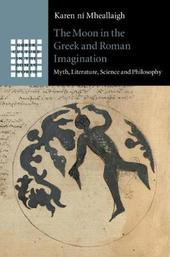
|
The Moon in the Greek and Roman Imagination: Myth, Literature, Science and Philosophy
Hardback
Main Details
| Title |
The Moon in the Greek and Roman Imagination: Myth, Literature, Science and Philosophy
|
| Authors and Contributors |
By (author) Karen ni Mheallaigh
|
| Series | Greek Culture in the Roman World |
|---|
| Physical Properties |
| Format:Hardback | | Pages:341 | | Dimensions(mm): Height 240,Width 160 |
|
| Category/Genre | Literature - history and criticism
Literary studies - classical, early and medieval |
|---|
| ISBN/Barcode |
9781108483032
|
| Classifications | Dewey:880.936 |
|---|
| Audience | | Professional & Vocational | |
|---|
| Illustrations |
Worked examples or Exercises; 6 Halftones, color; 2 Halftones, black and white; 3 Line drawings, black and white
|
|
Publishing Details |
| Publisher |
Cambridge University Press
|
| Imprint |
Cambridge University Press
|
| Publication Date |
22 October 2020 |
| Publication Country |
United Kingdom
|
Description
The Moon exerted a powerful influence on ancient intellectual history, as a playground for the scientific imagination. This book explores the history of the Moon in the Greco-Roman imaginary from Homer to Lucian, with special focus on those accounts of the Moon, its attributes, and its 'inhabitants' given by ancient philosophers, natural scientists and imaginative writers including Pythagoreans, Plato and the Old Academy, Varro, Plutarch and Lucian. ni Mheallaigh shows how the Moon's enigmatic presence made it a key site for thinking about the gaze (erotic, philosophical and scientific) and the relation between appearance and reality. It was also a site for hoax in antiquity as well as today. Central issues explored include the view from elsewhere (selenoskopia), the relation of science and fiction, the interaction between the beginnings of science in the classical polis and the imperial period, and the limits of knowledge itself.
Author Biography
Karen ni Mheallaigh is Professor of Greek in the Department of Classics and Ancient History at the University of Exeter. She is the author of Reading Fiction with Lucian: Fakes, Freaks and Hyperreality (Cambridge, 2014).
Reviews'The book will interest historians of ideas, scholars of ancient science and philosophy, and anyone engaged with science fiction. Recommended.' P. Nieto, Choice
|